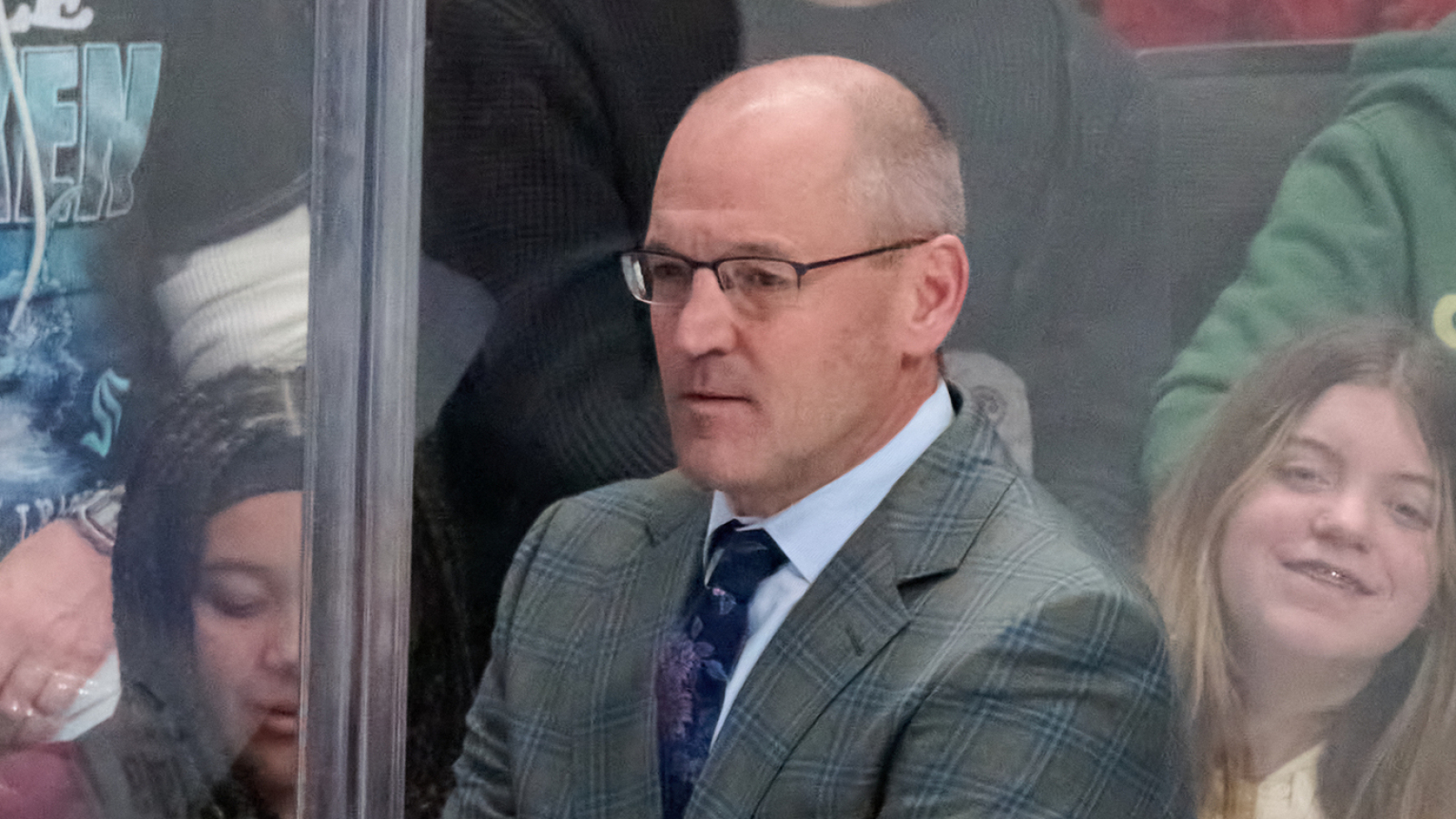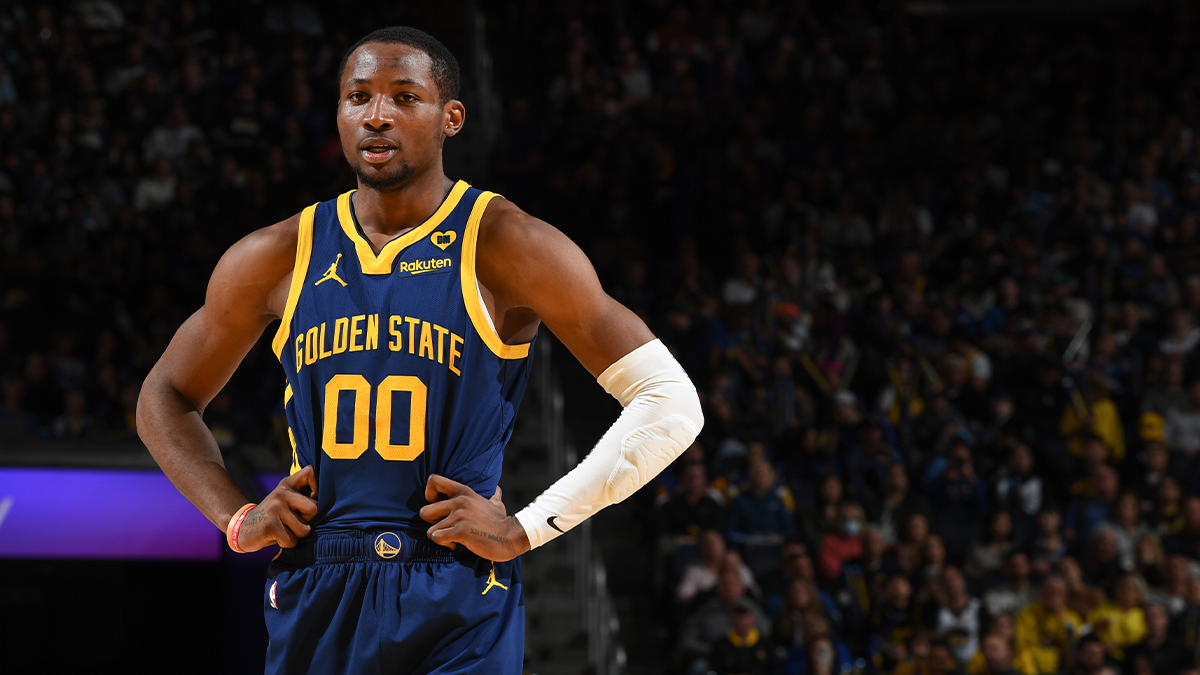It’s not always the stars who come through when the lights shine brightest and the games matter most. Here are 25 unheralded players, at the time, who broke out for some memorable Stanley Cup Final moments. Listed in chronological order.

The Hockey News
The 1937-38 Blackhawks went 14-25-9 and finished third in the American Division during the regular season. However, Chicago got hot in the playoffs and found itself in the Stanley Cup Final against the Toronto Maple Leafs. During that series, Karakas, the Blackhawks’ starter during the season and most of the playoffs despite putting up pedestrian numbers, did not play the first two games of the Cup Final due to injury. However, he returned for Chicago’s series-clinching victories in Games 3 and 4, allowing only a goal in each contest, to help the franchise win its second Stanley Cup.
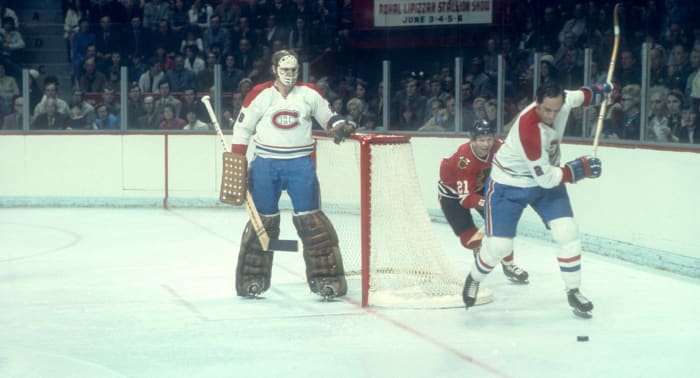
Bruce Bennett Studios via Getty Images Studios/Getty Images
Dryden’s performance during the 1971 playoffs essentially made him an instant franchise legend. He made his NHL debut in March of that season and posted a 1.65 goals-against average to win all six games he played down the stretch. Dryden then got the call — over established star Rogie Vachon — in the playoffs. Dryden truly earned star status while posting a 2.46 goals-against-average during Montreal’s seven-game triumph over Chicago in the Stanley Cup Final. The future Hall of Famer recorded 30 saves at least four times in the series, including 56 during the 2-1 loss in Game 1.
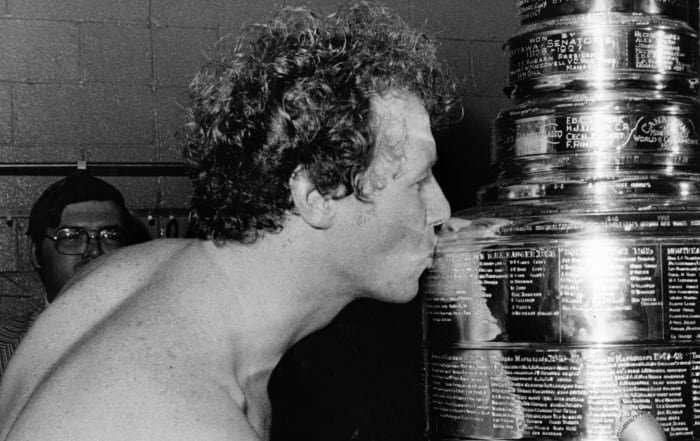
Frank O’Brien/The Boston Globe via Getty Images
Cashman enjoyed a successful 17-year NHL career, all spent with the Boston Bruins. He won two Stanley Cups as the enforcer and grinder on the famed Bruins’ line with legend Phil Esposito and the underrated Ken Hodge. However, during the 1972 playoffs and the Bruins’ run to a second Cup triumph in three seasons, Cashman recorded a then-career-high 11 postseason points. Modestly breaking out of Esposito’s shadow, Cashman scored three times in the Stanley Cup Final against the rival New York Rangers. Two of those goals came during the third period of Boston’s 3-0 victory in the Game 6 clincher.
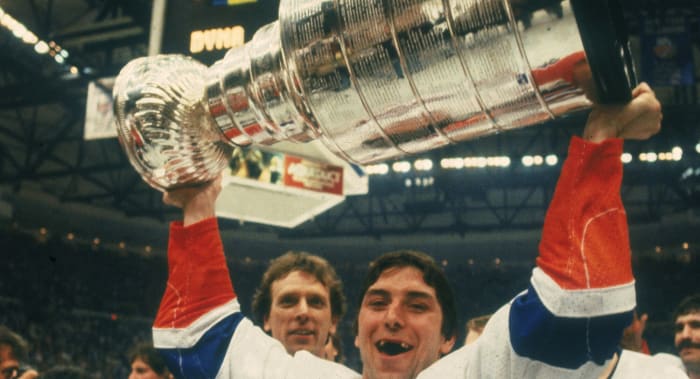
Bruce Bennett Studios via Getty Images Studios/Getty Images
Legendary names like Mike Bossy, Bryan Trottier, Butch Goring, Clark Gillies and Denis Potvin were just a few who fueled the Islanders’ dynasty of the early 1980s. Carroll, a valuable grinder, was part of three of the Isles’ four straight Stanley Cup-winning teams, but hardly a household name beyond Long Island. After totaling eight points in 18 regular-season games as a rookie in 1980-81, Carroll registered 12 in 18 playoff contests that year. That included a goal with three assists during New York’s five-game victory over the Minnesota North Stars in the Cup Final.

Bruce Bennett Studios via Getty Images Studios/Getty Images
Entering the 1986 playoffs, Lemieux had two goals in 19 career regular-season games since debuting in 1983-84. However, he broke out in the ’86 postseason, scoring 10 times and adding six assists in 20 games. That goal total, which included four of the game-winning variety, ranks fifth for a rookie in a single playoffs. He registered a goal and two assists in the final two contests of Montreal’s five-game Stanley Cup Final victory over Calgary. Lemieux went on to win three more Stanley Cups and ranks among the top-10 all-time leaders with 80 playoff goals.
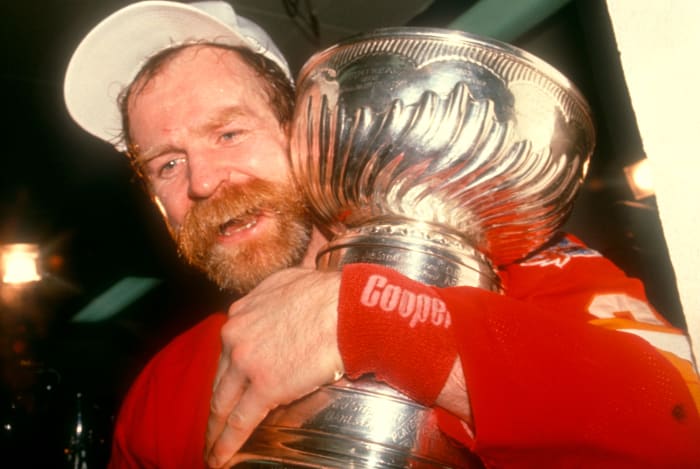
Bruce Bennett Studios via Getty Images Studios/Getty Images
The Hall of Famer concluded his exceptional NHL career in style by helping the Flames win the franchise’s first Stanley Cup in 1989. Though the aging McDonald notched just 18 points in 51 games during the 1988-89 campaign — his 16th in the league — and was a healthy scratch for Games 3, 4 and 5 of the Stanley Cup Final versus Montreal, McDonald saved the best for last. Inserted into the Flames’ lineup for Game 6, with his team ahead 3-2 in the series, McDonald scored the tiebreaking goal 4:24 into the second period, causing the home crowd to erupt. Calgary would never relinquish the lead and McDonald was able to hoist the Cup in storybook fashion.
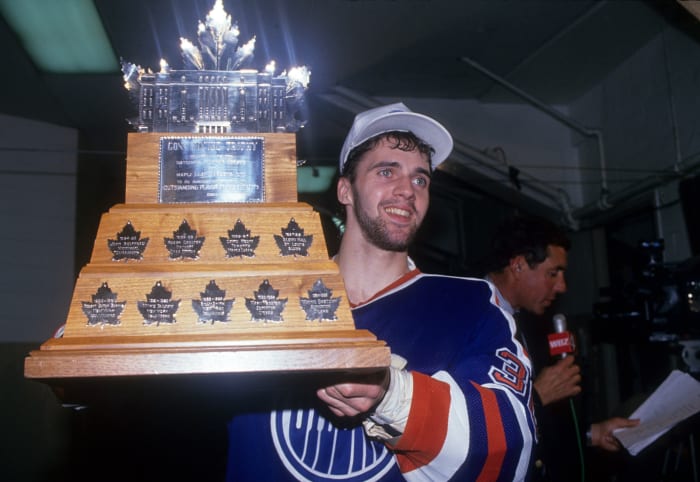
B Bennett/Getty Images
With the legendary Grant Fuhr hurt, Ranford took over as Edmonton’s No. 1 netminder in 1989-90. Ranford posted a 3.19 goals-against average during his 56 games that season, but certainly stepped up in the playoffs. He won 16 times while recording a 2.53 GAA and .912 save percentage during the Oilers’ somewhat surprising run to the franchise’s fifth and most recent Stanley Cup triumph. During the five-game Cup Final versus Boston, Ranford allowed just eight goals on 156 shots faced to secure the Conn Smythe Trophy.
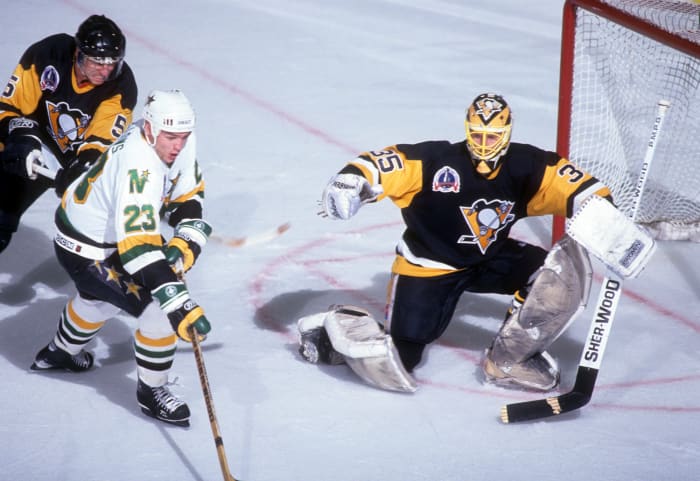
B Bennett/Getty Images
Barrasso won both the Calder and Vezina Trophies with Buffalo during his first NHL season. However, by 1990-91, he was starting for Pittsburgh, and sported a 3.59 goals-against average that season. Yet, the veteran owned a 2.60 GAA during the 1991 postseason, but exited Game 5 of the Stanley Cup Final against the Minnesota North Stars due to a groin injury. With Pittsburgh up 3-2 in the series, Barrasso was questionable for Game 6, but got the go-ahead and delivered a stellar 39-save performance during the Cup-clinching 8-0 rout. Barrasso would go on to help the Penguins repeat as Stanley Cup champions in 1992.
9 of 25
Paul DiPietro, Montreal Canadiens, 1993
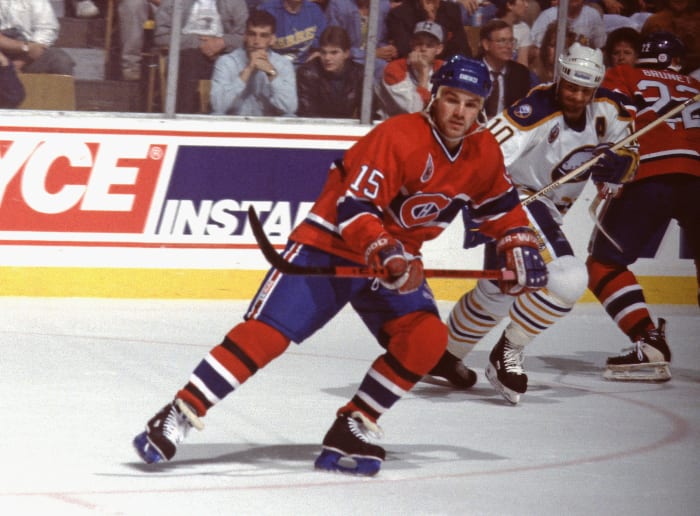
Robert Shaver/Bruce Bennett Collection/Getty Images
Among all the legendary players who’ve worn the storied Canadiens sweater, DiPietro is a name that doesn’t come to mind to the casual hockey fan. However, for Habs fans of a certain age, he’s a Stanley Cup hero. The grinding center played just six NHL seasons, and totaled 17 points in 29 regular-season contests during his second NHL campaign of 1992-93. However, DiPietro became a Canadiens folk hero with 13 points during the playoffs that season, and opened and closed the scoring in Montreal’s 4-1 Game 5 Stanley Cup-clinching win over Los Angeles in front of the home crowd.
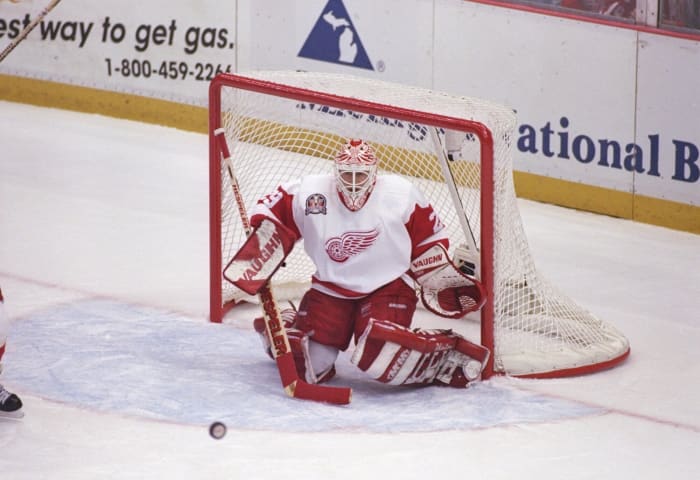
Al Bello/Allsport/Getty Images
Vernon was a five-time NHL All-Star, but by 1996-97 was nearing the end of his career. He was the backup to Chris Osgood during that campaign, but Detroit coach Scotty Bowman opted to go with Vernon in the playoffs after his starter struggled down the stretch. The move paid off as Vernon went 16-4 with a 1.76 goals-against-average and allowed just six goals during the Red Wings’ Stanley Cup Final sweep of Philadelphia. He won the Conn Smythe Trophy as playoffs MVP.
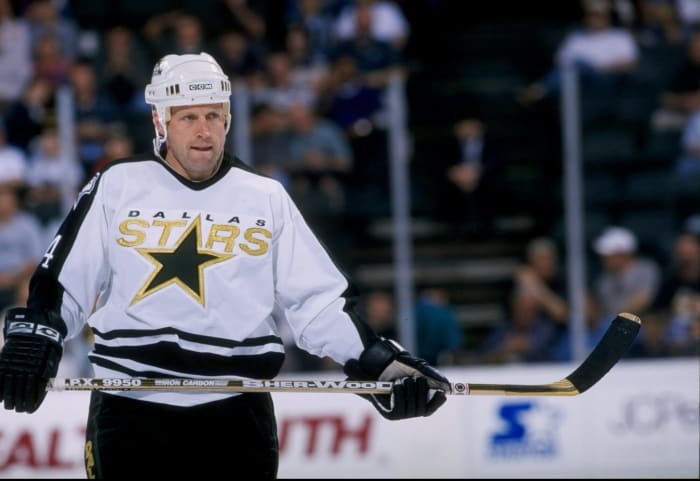
Stephen Dunn /Allsport/Getty Images
Reid played 18 NHL seasons, and was known mostly as a solid penalty killer who would chip in some offense from time to time. Prior to the 1999 playoffs, Reid totaled 17 points during his first nine postseason campaigns. However, during the Stars’ run to the Stanley Cup in ’99, he posted a playoff career-high 10 points, and two of his eight assists came during Dallas’ comeback 2-1 victory at Buffalo in Game 3 to take a 2-1 lead in the series, which it would go on to win in six.
12 of 25
Igor Larionov, Detroit Red Wings, 2002
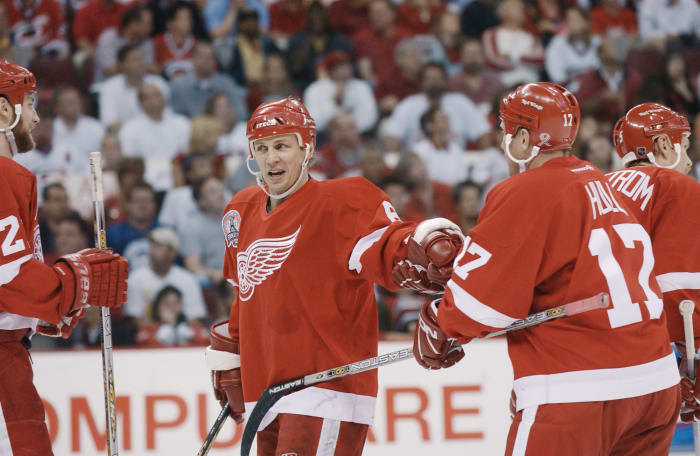
Dave Sandford/Getty Images/NHLI)
Larionov is a Hall of Famer and played a key role in Detroit’s back-to-back Stanley Cup triumphs in 1997 and ’98. However, after a brief, but rough, stint with Florida to open the 2000 season, Larionov was back in Detroit by the end of that campaign. The next season, the 41-year-old Larionov totaled a respectable 43 points in 70 regular-season games, but was no longer a focal point of the Red Wings’ attack. However, he played like the star he had long been in Detroit’s victorious 2002 Stanley Cup Final against upstart Carolina, notching three goals with an assist. The highlight was his game-winning goal late in triple overtime of Game 3.
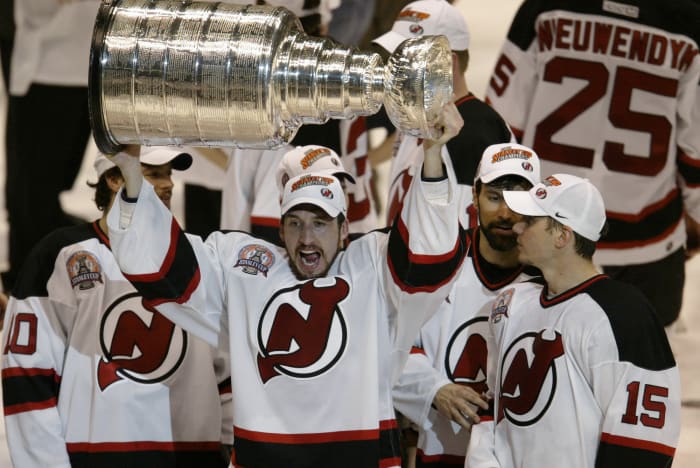
Brian Bahr/Getty Images/NHLI
After debuting with five goals in 26 games of the 2002-03 season, Rupp struggled down the stretch and was left off the Devils’ postseason roster until the Stanley Cup Final against Anaheim. Rupp then became a Devils icon by etching himself in Stanley Cup Final lore for recording three points in New Jersey’s 3-0 victory in Game 7. That included the game’s opening goal early in the second period, which still leaves Rupp as the only player in NHL history whose first career-playoff goal was also the Stanley Cup winner. Rupp would score one more playoff goal during his 11-year career.
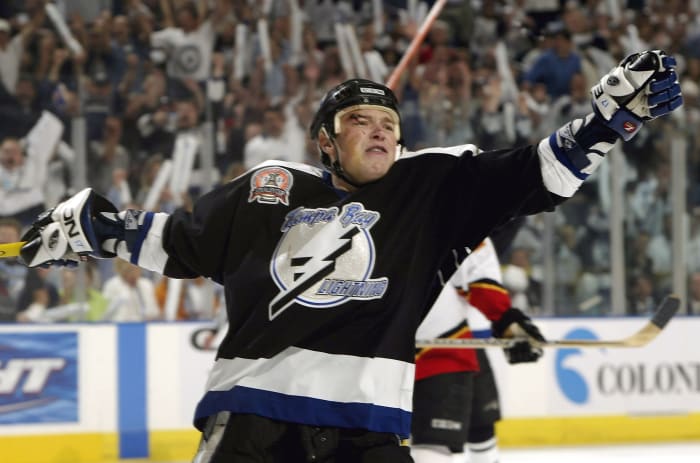
Brian Bahr/Getty Images
Brad Richards and Martin St. Louis were the stars of the Lightning’s 2004 run to the franchise’s first-ever Stanley Cup celebration. However, Fedotenko was the unheralded star of Tampa Bay’s postseason, registering 12 goals in 22 games — five fewer than he recorded in 77 regular-season contests that year. Fedotenko’s highlight came by scoring both goals in the Lightning’s 2-1 victory over Calgary in the clinching Game 7 of the Stanley Cup Final.
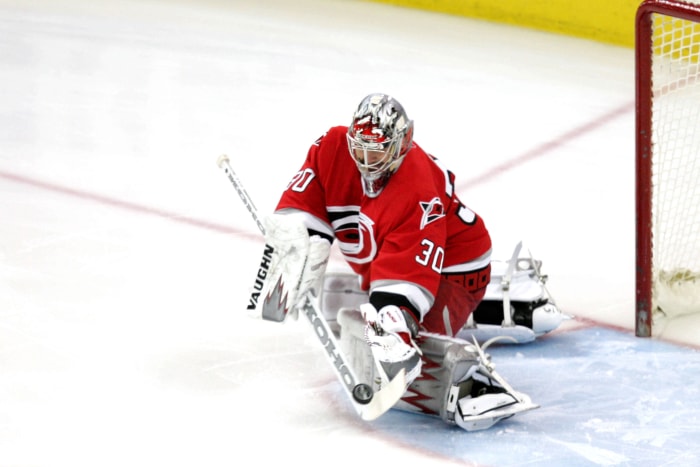
Scott Bales/Icon Sportswire
While solid during the 2005-06 regular season, winning 14 games in 28 appearances, Ward was a major reason the Hurricanes made their impressive run to the franchise’s first Stanley Cup triumph that same season. He registered a 2.14 goals-against-average and .920 save percentage while tying an NHL then-playoff record with 15 wins by a rookie goaltender as well as two shutouts. Ward posted a 2.28 GAA and one of those shutouts during Carolina’s Stanley Cup Final versus Edmonton. He stopped 22-of-23 shots in the Canes’ 3-1 Game 7 victory.
16 of 25
Max Talbot, Pittsburgh Penguins, 2009
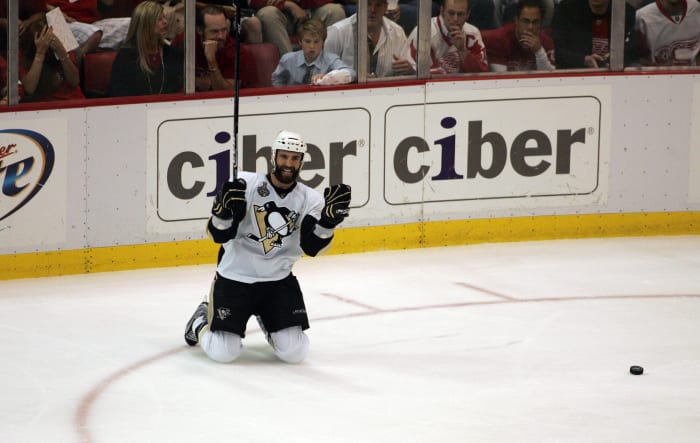
Tony Ding/Icon Sportswire
Serviceable and dependable, Talbot was the consummate teammate and excellent on the penalty kill during his 11-year NHL career. During that career, Talbot recorded just seven multi-goal games, but three of those came during the postseason, including two during the Penguins’ 2009 Stanley Cup Final against the Detroit Red Wings. Talbot, who posted 13 points in 24 playoff contests that season, became a Pittsburgh legend when he did all the scoring, on a team that featured Sidney Crosby and Evgeni Malkin, in the Penguins’ 2-1 Game 7 win at Detroit.
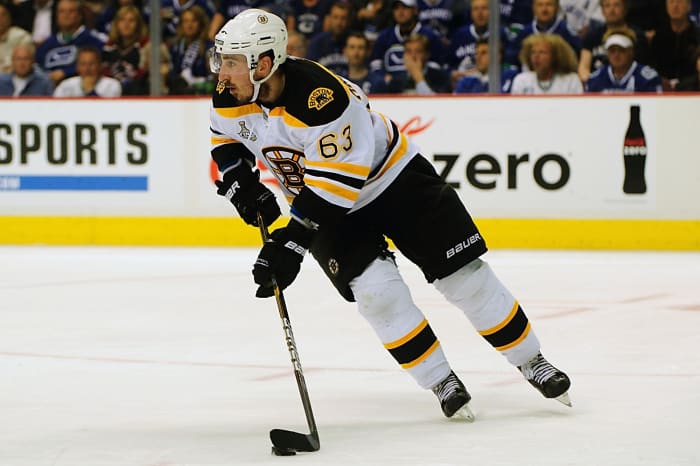
Anne-Marie Sorvin/Imagn Images
It seems only yesterday that Marchand was a promising rookie for the Bruins in 2010-11. Marchand’s introduction to the playoffs that season was highly impressive. He recorded 11 goals, five of which came in the final five games of Boston’s seven-game Stanley Cup Final triumph over Vancouver. He also posted eight assists during his 25 games in the 2011 postseason. Marchand’s 19 points from the 2011 postseason rank fifth among all rookies.
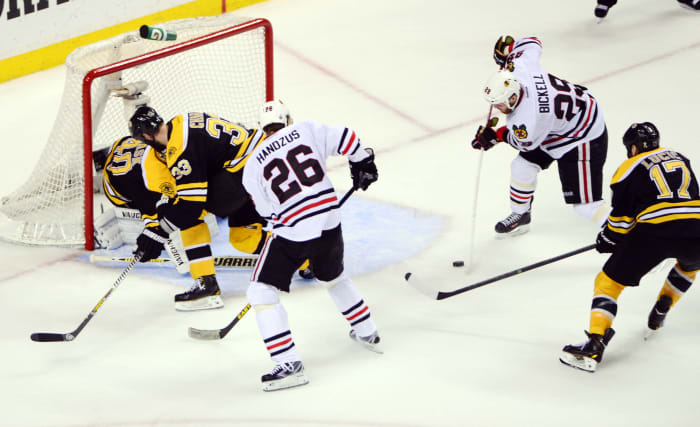
Michael Ivins/Imagn Images
Bickell proved to be a dependable third- and fourth-line winger during his career with the Blackhawks. But, during the 2013 playoffs, Bickell was an invaluable contributor while recording a career-high 17 points. Four of those points came against Boston in the Stanley Cup Final. To Blackhawks fans, Bickell will always be remembered for scoring the tying goal with 76 seconds remaining in regulation of the decisive Game 6 at Boston. Then, 17 seconds later, Dave Bolland gave Chicago a 3-2 win and its second Cup in three seasons with the go-ahead goal.
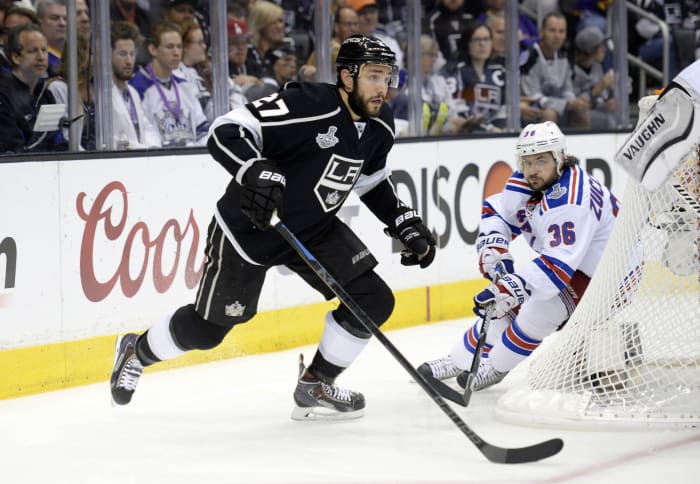
Gary A. Vasquez/Imagn Images
Martinez has long been one of the NHL’s top defensemen, and his breakout season came with 11 goals and 11 assists in 61 games for the Kings in 2013-14. However, many league experts didn’t necessarily expect Martinez to also play a major role in Los Angeles’ run to the franchise’s second Stanley Cup triumph in three seasons. In the postseason, Martinez posted five goals with five assists, including the overtime, series-clinching goal against Chicago in the Western Conference Finals. Martinez had just one point in the Final versus the New York Rangers, but it’s arguably the most memorable score in club history, coming in double overtime of Game 5 to secure the Cup.
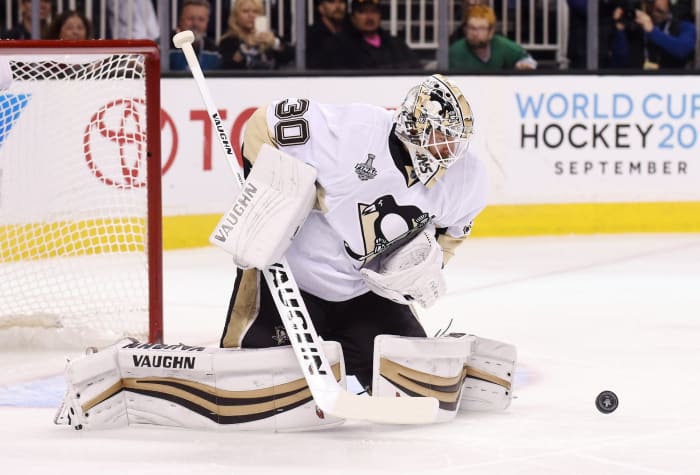
Gary A. Vasquez/Imagn Images
Murray made a smashing first NHL impression, winning nine of 13 starts with a 2.00 goals-against average during the 2015-16 regular season. When the 2016 playoffs rolled around, Murray, who had displaced veteran Marc-André Fleury in net for the No. 1 job, proved his worth by going 15-6-0 with a 2.08 GAA and .923 save percentage. He was simply stellar during the Penguins’ six-game Stanley Cup Final victory over San Jose, allowing 11 goals on 138 shots faced.
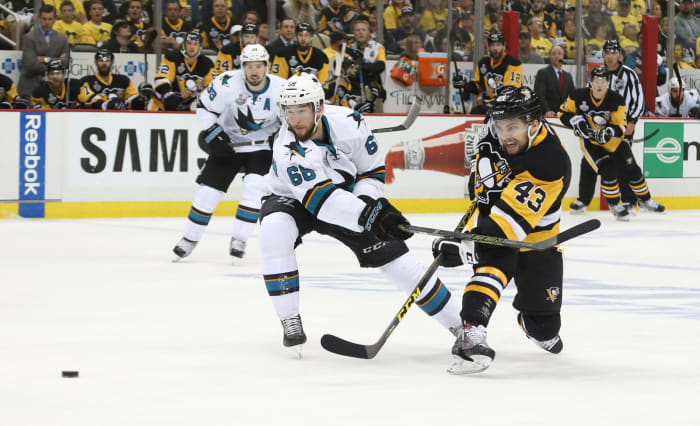
Charles LeClaire/Imagn Images
Yes, yet another unlikely playoff star for the Penguins in 2016. Sheary also made his NHL debut during the 2015-16 season, playing 44 games and posting 10 points. In the playoffs that season, however, Sheary equaled that points output in 23 games for Pittsburgh. Sheary netted goals in each of the first two games of the Cup Final versus San Jose, highlighted by the game-winner 2:35 into overtime of Pittsburgh’s 2-1 victory in Game 2.
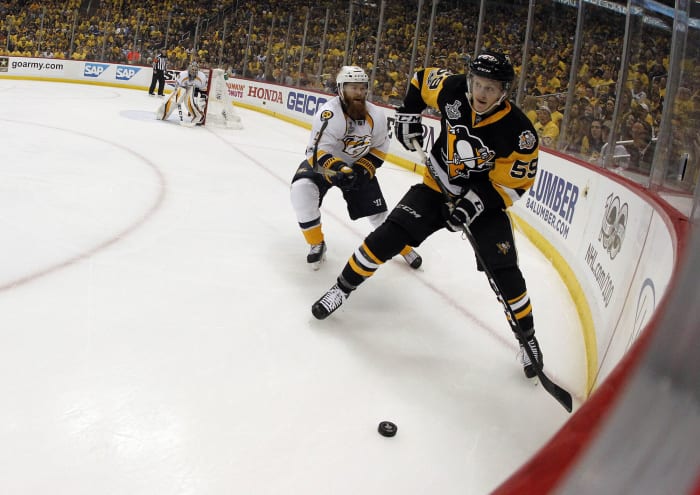
Charles LeClaire/Imagn Images
One year later, the Penguins repeated as Stanley Cup champions and another franchise star was born. Guentzel recorded 33 points in 40 regular-season contests in 2016-17, then tied the NHL rookie single-season playoff record with 21. That included 13 postseason goals, which rank second for a rookie. Guentzel scored four times in the first three games during the Cup Final against upstart Nashville.
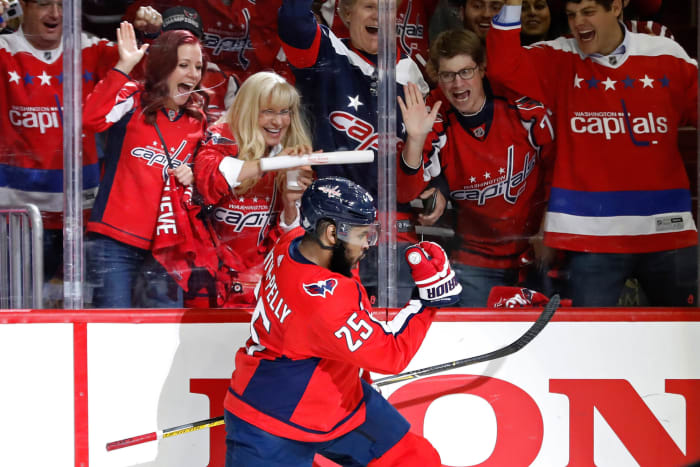
Geoff Burke/Imagn Images
Playing for his fourth NHL team in seven NHL seasons, Smith-Pelly never recorded more than 14 goals in a campaign. However, this fourth-liner came to play during the 2018 playoffs for the Capitals. Smith-Pelly registered seven goals in 24 playoff games in ’18, including one in each of the final three of Washington’s five-game Stanley Cup Final triumph over Vegas. That including a third-period tying tally during the decisive Game 5.
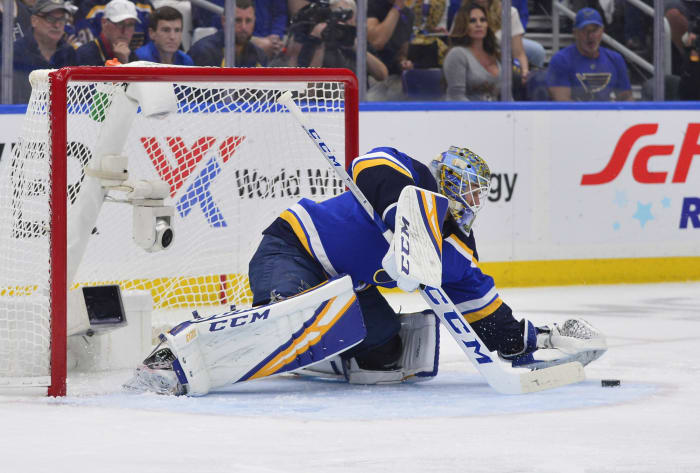
Jeff Curry/Imagn Images
Binnington was called up by the Blues in December 2018, and won 24 times in 32 appearances — while posting a stellar 1.89 goals-against-average — the rest of the regular season. But, did many really think Binnington could keep that up and lead St. Louis to its first Stanley Cup? Though Binnington wasn’t nearly as dominant in the playoffs, he did set the NHL rookie record with 16 postseason wins and had a 2.46 GAA. He allowed nine goals in the final four games of the Stanley Cup Final, and delivered a brilliant 32-save effort in the Blues’ 4-1 win at Boston in Game 7.
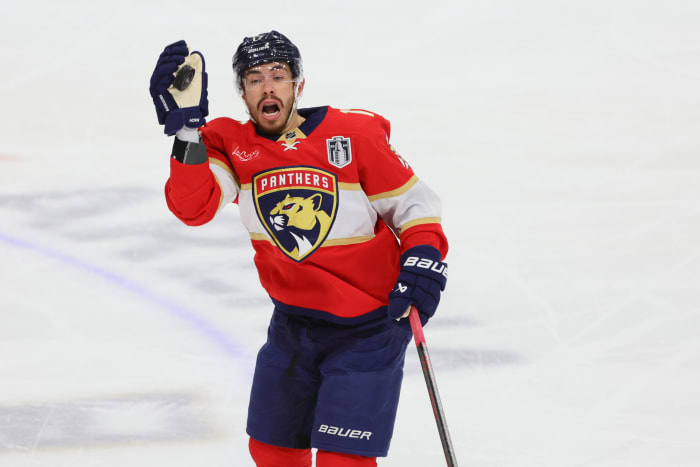
Sam Navarro/Imagn Images
Stars like Matthew Tkachuk, Aleksander Barkov and Sergei Bobrovsky might have received most of the attention during Florida’s run to the 2024 Stanley Cup. But Rodrigues is a veteran with a penchant for coming through in the clutch. That was certainly the case during these playoffs, when he recorded seven goals and eight assists for 15 points — four more than he totaled in his previous three playoff seasons with Pittsburgh and Colorado. Rodrigues proved to be at his best during the dramatic seven-game Stanley Cup Final versus Edmonton, posting four goals and three assists.

